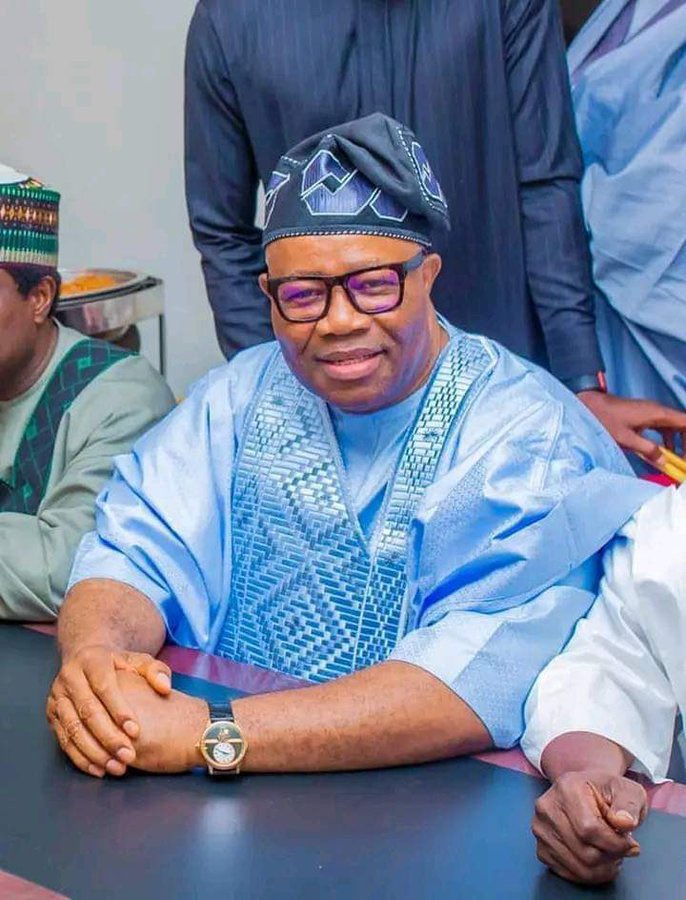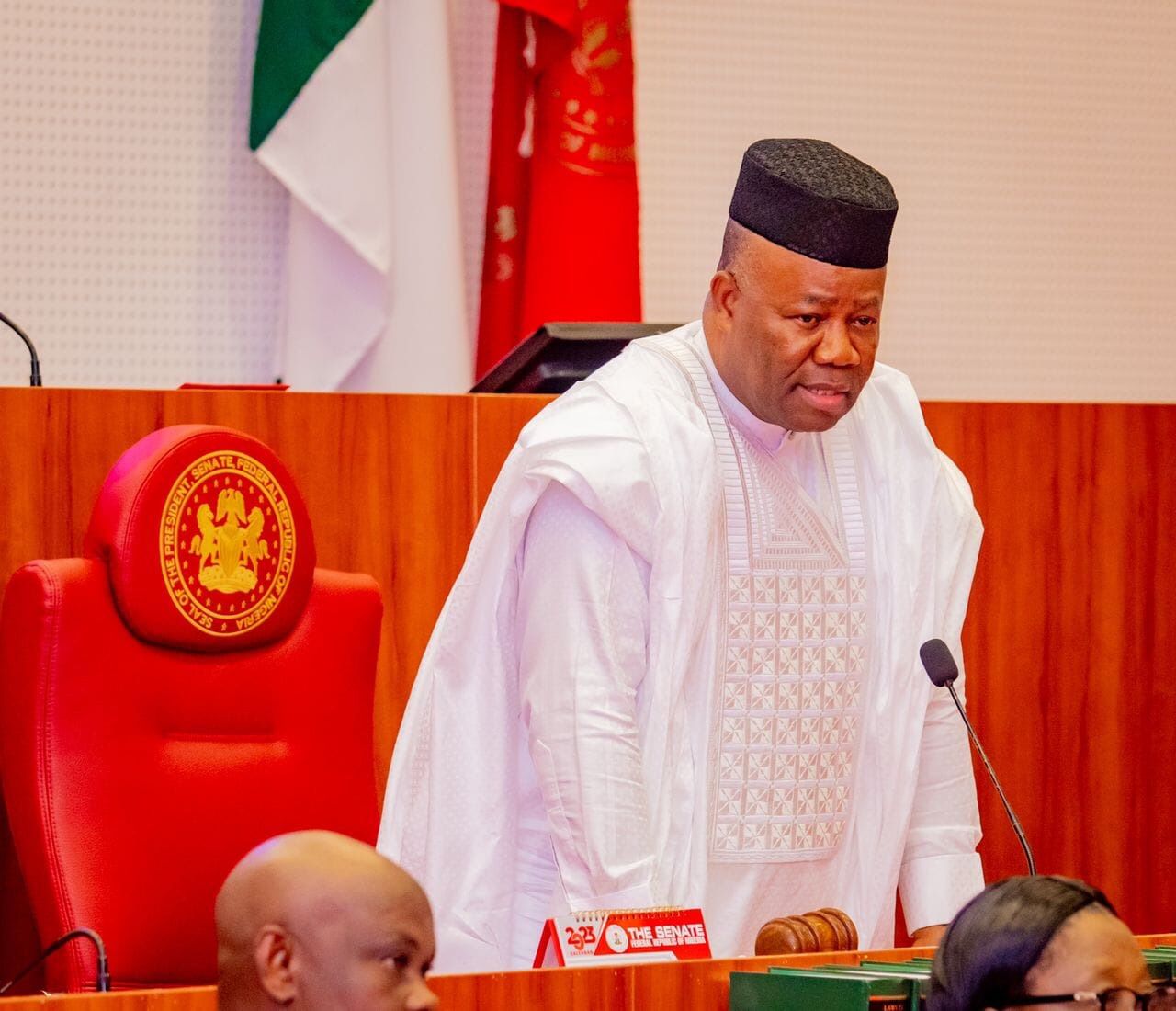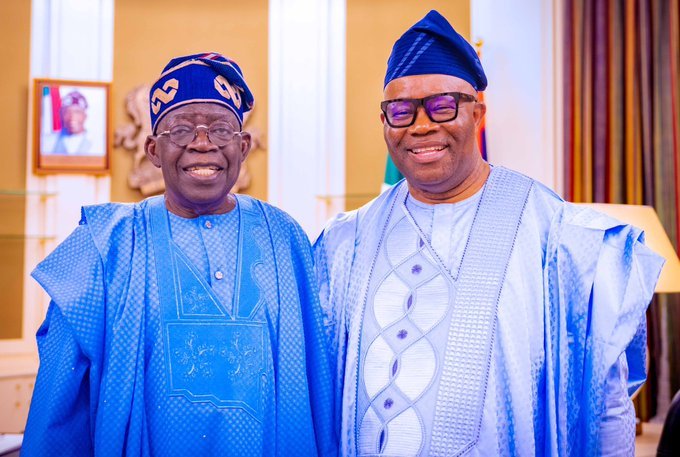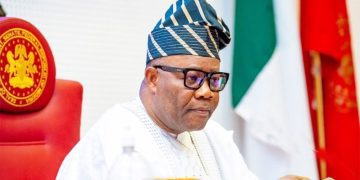Senator Godswill Akpabio, a towering figure in Nigerian politics, embodies a career marked by transformative governance, strategic maneuvering, and enduring controversy, rising from the Annang heartland of Akwa Ibom State to the pinnacle of legislative power as President of the Senate.
Born on December 9, 1962, in Ukana, Essien Udim, Akpabio’s journey began in a family steeped in leadership—his grandfather a Warrant Chief, his uncle a regional minister—shaping a path that would see him govern Akwa Ibom State from 2007 to 2015, serve as a federal minister, and ascend to the Senate’s highest office on June 13, 2023.
At 62, his name resonates as a symbol of ambition and resilience, navigating Nigeria’s complex political terrain with a blend of charisma, legal acumen, and a knack for reinvention that has kept him relevant across decades and party lines.
This biography delves into the multifaceted life of a man whose influence spans classrooms, boardrooms, and the hallowed chambers of Nigeria’s National Assembly, offering a lens into the interplay of power, progress, and scrutiny in one of Africa’s most dynamic democracies.
From his early education at Federal Government College, Port Harcourt, to his legal training at the University of Calabar, Akpabio built a foundation that propelled him through roles as a telecom executive, a two-term governor, and a senator representing Akwa Ibom North-West.
His tenure as governor redefined Akwa Ibom’s infrastructure, while his defection from the People’s Democratic Party (PDP) to the All Progressives Congress (APC) in 2018 and subsequent rise to Senate President highlight his political dexterity.
Yet, his legacy is not without blemish—corruption allegations, EFCC probes, and recent Senate controversies shadow his achievements.
What follows is an in-depth exploration of his early years, political ascent, key accomplishments, personal life, and the evolving impact of a leader whose story reflects both the promise and the pitfalls of Nigerian governance as of March 26, 2025.

Bio-Data
| Name | Godswill Obot Akpabio |
| Date of Birth | December 9, 1962 |
| Age | 62 years old |
| Place of Birth | Ukana, Ikot Ntuen, Essien Udim Local Government Area, Akwa Ibom State, Nigeria |
| Spouse | Ekaette Unoma Akpabio |
| Height | Approximately 1.80 meters (5 feet, 11 inches) |
| Political Affiliation | All Progressives Congress (APC) |
| Current Position Held | President of the Senate of Nigeria (since June 13, 2023), representing Akwa Ibom North-West Senatorial District in the 10th National Assembly |
| Source | Bsgistnews.com |
Early Life and Education of Godswill Obot Akpabio
Godswill Obot Akpabio was born on December 9, 1962, in Ukana, Ikot Ntuen, Essien Udim Local Government Area, Akwa Ibom State, Nigeria, into a family with a legacy of leadership within the Annang ethnic group.
His father, Chief Obot Akpabio, a respected community leader, passed away when Godswill was young, leaving his mother, Madam Lucy Obot Akpabio (née Inyangetor), to raise him and his siblings.
This early loss instilled resilience in Akpabio, who grew up in a household influenced by his grandfather, Okuku Udo Akpabio, a Warrant Chief in Ikot Ekpene province, and his uncle, Dr. I. U. Akpabio, a former Minister of Education/Internal Affairs in Eastern Nigeria.
His cousin, Justice Nsima Akpabio, also served as a senator in Nigeria’s Second Republic, embedding a political heritage in his upbringing.
Akpabio’s educational journey began at Methodist Primary School, Ukana, followed by secondary education at Federal Government College, Port Harcourt, Rivers State, where he distinguished himself as Senior Prefect.
He pursued higher education at the University of Calabar, Cross River State, graduating with a Bachelor of Laws (LL.B.) degree.
Called to the Nigerian Bar after attending the Nigerian Law School, Akpabio’s legal training equipped him with the analytical skills that would later define his political career.

Akpabio’s Political Career
Akpabio’s entry into politics was preceded by a diverse professional stint—first as a teacher, then as an associate partner at Paul Usoro & Co., a prominent Nigerian law firm, and later as Managing Director and CEO of EMIS Telecoms Limited in Lagos, where he also served as National Publicity Secretary of the Association of Telecommunication Companies in Nigeria (ATCOM).
His political career began in earnest in 2002 under Governor Obong Victor Attah, who appointed him Commissioner for Petroleum and Natural Resources in Akwa Ibom State.
Between 2002 and 2006, he held additional portfolios in Local Government and Chieftaincy Affairs, and Lands and Housing, gaining broad administrative experience.
In 2006, Akpabio won the People’s Democratic Party (PDP) gubernatorial primary, defeating 57 contenders with his campaign slogan “Let God’s Will Be Done,” and was elected Governor of Akwa Ibom State in 2007.
Re-elected in 2011, he served until 2015, a tenure marked by significant infrastructure development.
In 2013, he was elected Chairman of the PDP Governors’ Forum, amplifying his national influence.
Transitioning to the Senate in 2015, he represented Akwa Ibom North-West (Ikot Ekpene) Senatorial District, polling 422,009 votes to secure victory under the PDP banner.
Named Senate Minority Leader in July 2015, he resigned in August 2018 to defect to the All Progressives Congress (APC).
Appointed Minister for Niger Delta Affairs by President Muhammadu Buhari in August 2019, Akpabio served until May 2022, resigning to pursue the APC presidential primaries, where he stepped down for Bola Tinubu.
He reclaimed his Senate seat in the 2023 elections with 115,401 votes, defeating Emmanuel Enoidem of the PDP.
On June 13, 2023, Senator Godswill Akpabio was elected President of the Senate in the 10th National Assembly, garnering 63 votes against Abdulaziz Yari’s 46, solidifying his status as Nigeria’s third-ranking official.
Major Achievements
Akpabio’s governorship (2007–2015) transformed Akwa Ibom State, earning him accolades for projects like the Ibom Tropicana Entertainment Centre, the 21-story Ibom Icon Hotel, and an extensive road network, alongside free education and healthcare initiatives.
His administration’s focus on infrastructure earned him the Best Governor for Infrastructure Development award from BEN Television, London, in 2009.
As Senate Minority Leader (2015–2018), he championed legislative cohesion within the PDP, and as Minister for Niger Delta Affairs (2019–2022), he oversaw development projects, though his tenure was marred by corruption probes.
His election as Senate President in 2023 marked a pinnacle, reflecting his political acumen and APC support.
Internationally, he received a Congressional Certificate of Recognition from the U.S. Congress in 2011 and was named an Honorary Citizen of Georgia, New Jersey.
However, his career has faced scrutiny, with the Economic and Financial Crimes Commission (EFCC) investigating alleged diversions of over NGN 100 billion during his governorship and NGN 40 billion as minister—cases yet to result in charges.
Personal Life
A practicing Catholic, Senator Godswill Akpabio is married to Ekaette Unoma Akpabio, founder of the Family Life Enhancement Initiative (FLEI), a non-profit focused on family welfare and Millennium Development Goals.
They have four daughters and one son, fostering a tight-knit family despite his demanding career. Akpabio also has a son, Glenn Udosen, from a previous relationship.
Known for his charisma, he authored Words that Build a Nation: Famous Words of Governor Akpabio in 2009, showcasing his rhetorical flair.
His personal life blends tradition—evident in his Annang cultural pride—with a modern, public-facing persona.
Legacy and Impact
As of March 26, 2025, Senator Godswill Akpabio’s legacy is of transformative governance, political resilience, and persistent controversy.
His eight-year governorship redefined Akwa Ibom’s infrastructure, while his Senate leadership has aimed for legislative stability, navigating a fractious 10th Assembly.
His defection from PDP to APC in 2018 and subsequent rise to Senate President underscore his adaptability, though allegations of corruption—from U.S. diplomats labeling his governorship “exceptionally corrupt” to recent EFCC summons—cast a shadow over his achievements.
Akpabio’s handling of recent Senate controversies, like the six-month suspension of Senator Natasha Akpoti-Uduaghan in March 2025 following her sexual harassment allegations against him (which he denies), has drawn criticism for gender bias and procedural overreach, spotlighting his leadership style.
At 62, he remains a polarizing figure—lauded for development, scrutinized for ethics—whose influence on Nigeria’s political landscape endures, shaped by a career that balances bold vision with the complexities of power in a dynamic democracy.

Conclusion
Senator Godswill Akpabio’s journey through Nigeria’s political landscape is a vivid chronicle of ambition, transformation, and the intricate dance between power and accountability, a narrative that resonates from the rural expanse of Ukana in Akwa Ibom State to the marbled halls of the National Assembly.
Born on December 9, 1962, into a family with a storied legacy of leadership, Akpabio rose from the crucible of loss—his father’s early death—to become a legal scholar, a telecom executive, and a political titan whose imprint spans two terms as Governor of Akwa Ibom State (2007–2015), a stint as Minister for Niger Delta Affairs (2019–2022), and his current role as President of the Senate since June 13, 2023.
At 62, his career reflects a relentless drive to shape Nigeria’s future, tempered by the controversies that have shadowed his ascent, making him a figure of both admiration and contention as of March 26, 2025.
Akpabio’s legacy is a tapestry woven with bold threads of achievement and frayed edges of scrutiny.
His governorship redefined Akwa Ibom, delivering infrastructure marvels like the Ibom Tropicana Entertainment Centre and a robust road network, alongside social programs like free education and healthcare—feats that earned him international recognition, including a U.S. Congressional Certificate in 2011.
His transition from PDP stalwart to APC strategist, culminating in his Senate presidency, showcases a political agility that has kept him at the forefront of Nigeria’s shifting power dynamics.
Yet, this narrative is incomplete without the persistent allegations of corruption—over NGN 100 billion allegedly diverted as governor, NGN 40 billion as minister—probed by the EFCC, alongside U.S. diplomatic cables branding his tenure “exceptionally corrupt,” though no convictions have materialized.
His recent leadership of the 10th Senate, marked by the controversial suspension of Senator Natasha Akpoti-Uduaghan in March 2025 amid harassment claims he denies, has further fueled debates about his stewardship and gender sensitivity.
Beyond the public sphere, Akpabio’s personal life—his marriage to Ekaette Unoma, their five children, and his Catholic faith—grounds him in a familial and cultural bedrock that contrasts with his high-stakes political persona.
His book, Words that Build a Nation, and his Annang pride reveal a man who sees himself as both orator and custodian of tradition.

As Senate President, he navigates a polarized legislature, balancing President Tinubu’s agenda with regional demands, a role that tests his ability to unify as much as he once built.
Whether history will remember him as a visionary developer or a symbol of Nigeria’s governance challenges—or both—remains an open question.
For now, Godswill Akpabio stands as a colossus in Nigerian politics, his legacy a complex blend of progress and paradox, a leader whose impact endures in the infrastructure of Akwa Ibom, the corridors of power in Abuja, and the ongoing discourse of a nation striving to reconcile its potential with its realities.
Frequently Asked Questions on Senator Godswill Akpabio
1. Who is Senator Godswill Akpabio?
Godswill Obot Akpabio is a Nigerian politician, lawyer, and the current President of the Senate since June 13, 2023. He previously served as Governor of Akwa Ibom State (2007–2015) and Minister for Niger Delta Affairs (2019–2022).
2. When and where was Senator Godswill Akpabio born?
He was born on December 9, 1962, in Ukana, Ikot Ntuen, Essien Udim Local Government Area, Akwa Ibom State, Nigeria.
3. What is Senator Godswill Akpabio’s age in 2025?
As of March 26, 2025, he is 62 years old.
4. What is Senator Godswill Akpabio’s educational background?
He attended Federal Government College, Port Harcourt, and earned a Bachelor of Laws (LL.B.) from the University of Calabar, later being called to the Nigerian Bar.
5. What political parties has Senator Godswill Akpabio been affiliated with?
He began with the People’s Democratic Party (PDP), serving as governor and senator, before defecting to the All Progressives Congress (APC) in August 2018.
6. When did Senator Godswill Akpabio become Governor of Akwa Ibom State?
He was elected Governor in 2007 and re-elected in 2011, serving until May 29, 2015.
7. When did Senator Godswill Akpabio become Senate President?
He was elected President of the Senate on June 13, 2023, in the 10th National Assembly, defeating Abdulaziz Yari with 63 votes to 46.
8. What roles did Senator Godswill Akpabio hold before becoming Senate President?
He was Commissioner in Akwa Ibom (2002–2006), Governor (2007–2015), Senate Minority Leader (2015–2018), and Minister for Niger Delta Affairs (2019–2022).
9. Why did Senator Godswill Akpabio defect from PDP to APC?
He defected in August 2018, citing alignment with President Muhammadu Buhari’s agenda and dissatisfaction with PDP leadership, a move that bolstered his national prominence.
10. What is Senator Godswill Akpabio’s current role in the Nigerian government?
As of March 26, 2025, he is the President of the Senate, Nigeria’s third-ranking official, leading the 10th National Assembly.
11. What is the scandal between Senator Godswill Akpabio and Senator Natasha Akpoti-Uduaghan?
In February 2025, Senator Natasha Akpoti-Uduaghan accused Akpabio of sexual harassment, alleging inappropriate advances since December 2023. Akpabio denies the claims, and the Senate suspended her for six months on March 6, 2025.
12. What did Senator Natasha Akpoti-Uduaghan accuse Senator Godswill Akpabio of?
She alleged Akpabio made suggestive comments (e.g., about her waist) and advances, including during a 2023 visit to his Akwa Ibom home, claiming he linked her Senate motions to sexual favors.
13. How did Senator Godswill Akpabio respond to Natasha Akpoti-Uduaghan’s allegations?
Akpabio denied the accusations on March 5, 2025, during a plenary session, asserting he has never harassed any woman and citing his respect for his four daughters and late mother’s upbringing.
14. Why was Senator Natasha Akpoti-Uduaghan suspended by the Senate?
On March 6, 2025, the Senate suspended her for six months, citing “unruly and disruptive behavior” during a February 20, 2025, seating dispute, though she links it to her harassment petition against Akpabio.
15. What happened during the February 20, 2025, Senate seating dispute with Akpabio?
Akpabio reassigned Natasha’s seat, sparking a confrontation. She claims it was a “set-up” to silence her, escalating tensions that led to her harassment allegations.
16. Why did the Senate reject Senator Natasha’s petition against Akpabio?
The Ethics Committee dismissed it on March 5, 2025, for procedural errors—Natasha signed it herself, violating Senate rules requiring another senator’s endorsement.
17. What has Senator Godswill Akpabio said about Natasha’s UN appeal?
On March 14, 2025, Akpabio accused her of distorting facts and embarrassing Nigeria by raising her suspension and allegations at the UN Inter-Parliamentary Union meeting in New York.
18. How has the public reacted to the Akpabio-Natasha scandal?
Protests erupted in Abuja on March 5, 2025, with groups supporting Akpabio and others chanting “Akpabio must go,” while women’s rights groups condemned Natasha’s suspension as sexist oppression.
19. What legal actions have followed the Akpabio-Natasha controversy?
Natasha filed a suit (FHC/ABJ/CS/384/2025) against Akpabio and the Senate, prompting a Federal High Court order on March 10, 2025, for them to respond. SERAP also sued Akpabio on March 16, 2025, over her “unlawful” suspension.
20. Did Senator Godswill Akpabio apologize to Natasha Akpoti-Uduaghan before the scandal?
Yes, in July 2024, he apologized for saying “the Senate is not a nightclub” after she spoke out of turn, following public backlash, though this predates the 2025 allegations.
21. What are Senator Godswill Akpabio’s key achievements as Governor?
He spearheaded infrastructure projects like the Ibom Tropicana Entertainment Centre, extensive roads, and social programs like free education, earning a 2009 Best Governor award from BEN Television.
22. What corruption allegations has Senator Godswill Akpabio faced?
The EFCC has probed him for allegedly diverting over NGN 100 billion as governor and NGN 40 billion as minister, with no convictions. U.S. diplomats once called his tenure “exceptionally corrupt.”
23. What other harassment claims has Senator Godswill Akpabio faced?
In 2020, ex-NDDC MD Joy Nunieh accused him of harassment; Akpabio denied it and vowed legal action in March 2025, amid Natasha’s allegations.
24. How has Senator Godswill Akpabio’s Senate leadership been perceived?
Critics cite authoritarianism—e.g., Natasha’s suspension and past comments—while supporters praise his legislative experience and alignment with President Tinubu’s agenda.
25. Who is Senator Godswill Akpabio married to?
He is married to Ekaette Unoma Akpabio, a philanthropist, with whom he has four daughters and one son. He also has a son, Glenn Udosen, from a prior relationship.


















